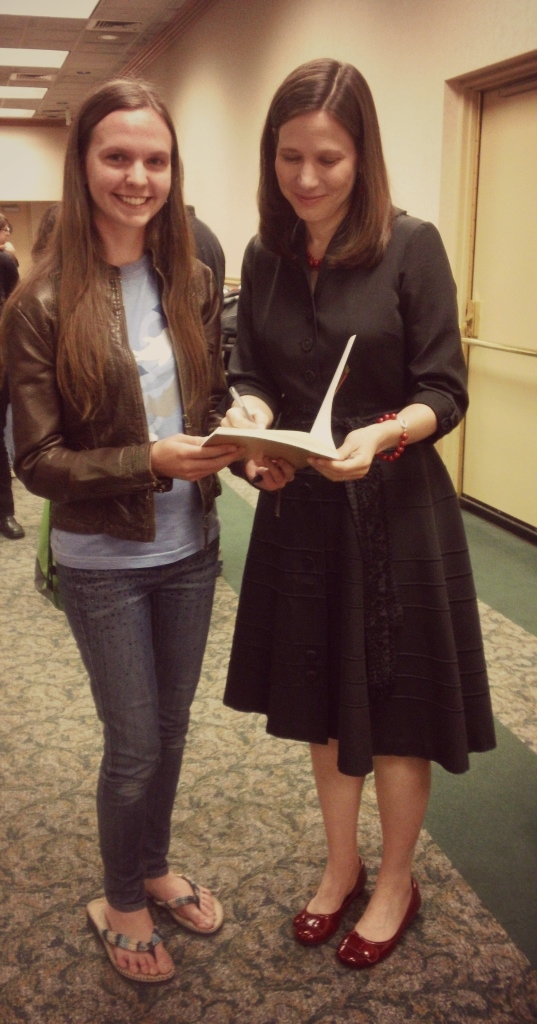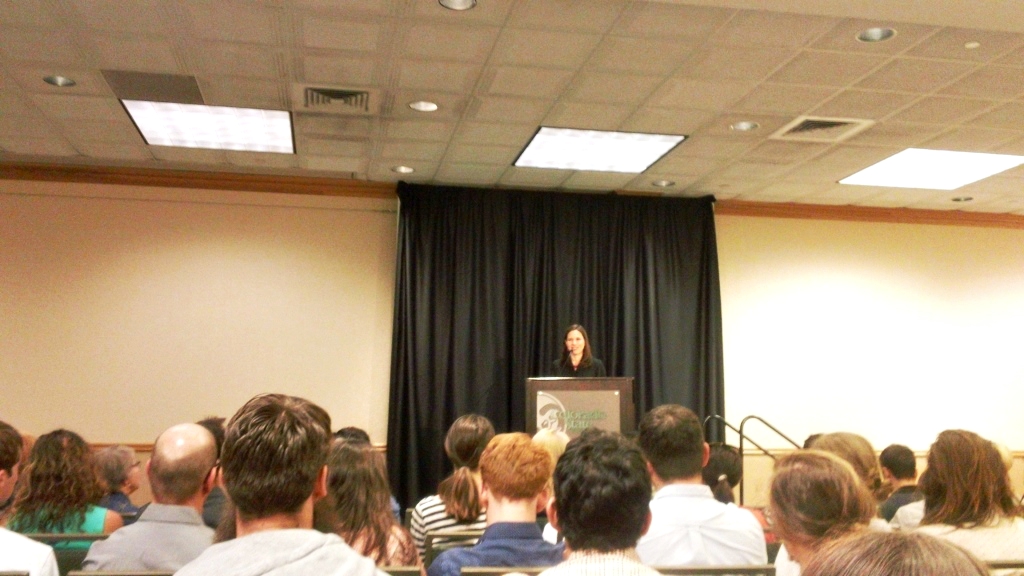by English Department Communications Intern Ashley Alfirevic
Poetry lovers filled the LSC’s North Ballroom for the first of this semester’s Creative Writing and Reading Series. The room had a palpable buzz while waiting for Mary Szybist, winner of the National Book Award for Poetry with her latest creation, Incarnadine. The eager chatter and persistent clanging of the cash register in back quickly silenced for introductions. “We’re here to inspire, explore, and reimagine the familiar,” said Morgan Library representative Bruce Hallmark.
Because the openers had already introduced her, Mary began by introducing us to her poetry. The first piece, an elegy for a former student, provided a description of “Heaven in Miniature,” somehow creating a tangible version of an afterlife by “counting up the things you love and realizing you lack nothing,” like counting all of the things in your pockets to remember if you brought your keys. Mary’s poems somehow make death feel vaguely familiar and conciliatory, adding before her poem about fish eyes that, “One of the great things about poems is you can talk to the dead.” Some poems make an observational interlude between suffering and ending — the flickering signal of a firefly being consumed by a spider, Lucifer and light blending in a poem of “courtship and hunger,” or seagulls feasting on the wounds of a whale, asking, “why wouldn’t such sweetness be for them?”
But Mary’s poems are anything but morbid. They’re simple and beautiful, sometimes funny and always genuine. Her language is accessible, and the lilt of her voice makes you feel like you’ve known her for a very long time. She read another poem using language about Nabokov’s Lolita, Bill Clinton and Monica Lewinski, and Mary’s Annunciation, combining the power imbalances and sexual charge of all three to let them “shimmer all at once” with “intolerable tenderness.” She read another about teenage girls assembling a puzzle, a realistic and light-hearted poem that treats their comments about the veins in a grandmother’s hands and the allure of a velvet bikini with equal weight. She concluded her reading with a poem called “The Lushness of It,” and said, “You’d be as good as anyone, I think, to an octopus.”
At one point, Mary pressed the pages of Incarnadine wide and showed us the poem “How Not to Speak of God,” shaped round like a sun with radiant light extending from it, and said, “We often confuse faith and doubt, which we too easily think are different sometimes.”
What Mary’s poems discussed the most, and what I found the most relatable, was her struggle with the icon of the biblical Mary. She said she grew up loving her, but now toils to conceive her as an icon for women. Some poems were from the biblical Mary’s perspective, addressing the things women say yes and no to, what women are dutiful to, and what it means to be a mother. During the question and answer session, someone asked about her “fascination with Christianity.”
“It’s funny you call it a fascination,” she said, almost with a tone of curiosity in her voice. “To me it was so deeply alive. It was my world.” Mary went on to describe that after her break from Christianity, it was necessary to create religious figures differently in her imagination because “ignoring them doesn’t make them go away. They’re still in you even if you don’t believe the same way.” She said a sense of ownership in her poems converted the biblical Mary from a symbol, an object of contemplation, into someone she can have a relationship with.
As someone who attended Catholic school until college, who ended each school day with the Memorare (a prayer honoring the Virgin Mary), and had a rosary hanging on my rear-view mirror, Szybist’s poems hit me in such an old, odd place. I understood her “fascination,” her struggle in dealing with religious figures that you loved as a girl now that you are a woman. After her reading, I felt like I had a revelation of my own, not one that made me want to announce or denounce anything or anyone, but simply extend warmth and friendship towards the women, iconic or otherwise, in her poetry.

